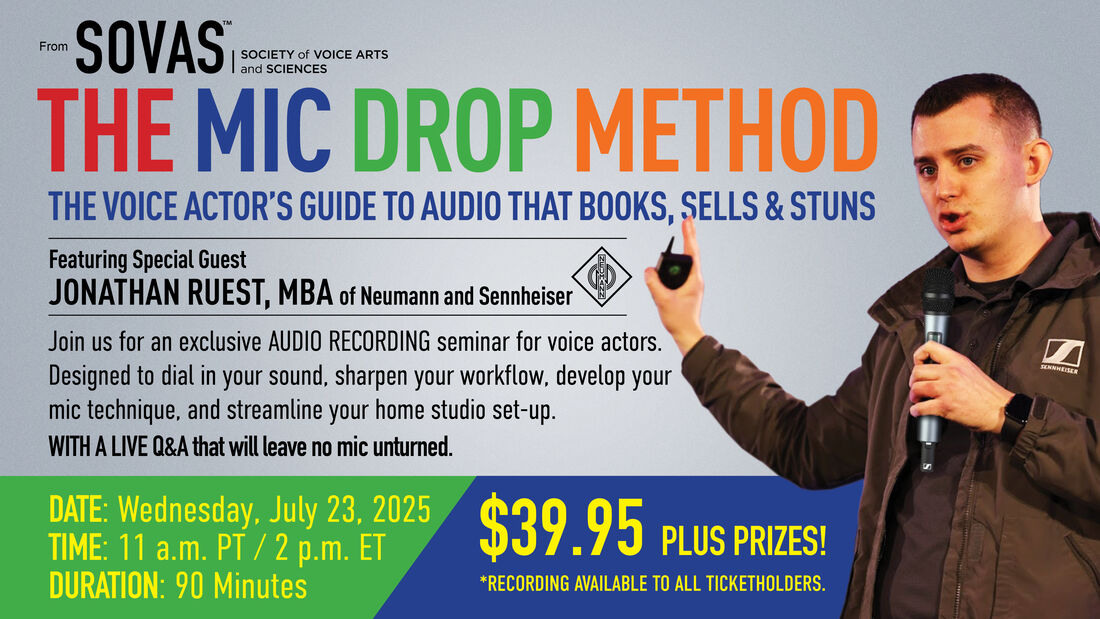As a voice actor, understanding the mindset of the creative director/buyer/client is a tremendous asset. Before the era of home studios proliferation, this was a skill you learned on the job, working with them face to face. You would witness their day-to-day challenges—rewrites, time pressures, approvals, and last-minute changes. Today’s voice actor is so far removed from the experience of the buyer, that his or her attempts to deepen an existing relationship or start a new one are often uninformed, awkward, and sometimes detrimental to employment. Our belief is that everything you do as a voice actor—from auditioning to networking to branding—will be exponentially improved by learning to appreciate the buyer’s point of view.
Join us now, on a magical trip to the world of TV Land. With the help of VP Creative Director, TV Land Brand Creative Group Tom Hill and his right hand, VP Executive Producer, TV Land Brand Creative Group Deva Newman. We hope to give you a practical look into the world on the other side of the microphone.
VO Exchange: Describe the process that goes into determining the language of the script?
Hill: At TV Land, we still have writers and producers—with a growing contingent of “preditors” [an industry term describing a producer who also edits] naturally, but it means that we often start with a script, as opposed to a rough cut. Some scripts—especially the more conceptual ones that might require special attention to voice-over—are ones we sweat over. We write them, read them aloud in our weekly “writers’ meeting” and then edit them again. Other scripts go through a similar process, but with less focus on details because we know that once that spot gets into the editing suite, things are gonna change.
VO Exchange: As a TV network, your programs and the network itself are the products. Do you deal with these products any differently than advertisers of more traditional consumer goods?Hill: I’ve always explained the difference between on-air promotion and advertising as that we are really as much “packaging” as we are advertising. A viewer of the network has already made their “purchase.” They are watching your network. Now you want to get them to stay, to enjoy the experience, and to plant the idea of coming back. But it’s not a hard sell or an argument or a demand. I sometimes think of it as someone eating breakfast cereal and we’re the box. On that box we certainly make the product look good, but we also have additive material, little branded nuggets of information. Things that make them feel good about the decision they’ve already made. We can, to a degree, treat them like friends, not potential “buyers” who need a hard sell.
VO Exchange: What do you look for in an audition?
Hill: We are listening to see who can make the spot sing.
Newman: Right! If there are turns, or logical shifts or jokes, it’s simply a matter of finding someone who makes it work. As we all know, it is so much about timing. It’s so great when we get to work with the legendary comic actors in our shows! Betty White’s timing is always so amazing. Wayne Knight and Cedric the Entertainer, too. So many funny actors.
Hill: Once upon a time we looked for general vocal quality and acting talent, and then only worked on the specific script in session, with lots of direction. Now we give top-line direction as part of the audition…and hearing what the voice-over comes up with is definitely a part of getting the assignment.
Newman: Producers are always looking to see what the talent brings to the table before they direct it too much. You learn new things about the script by hearing a fresh take. Once we’ve booked the talent and are recording the spot, producers dive more into the directing nuances with a goal to get just the right performance to make the spot “sing,” as Tom referred to earlier!
VO Exchange: Do you generally go through agents or casting directors for voice talent?
Newman: We use an online service for broad searches…it really is a gold mine out there, with so much talent. And it makes it very easy to search for specific expertise and find what you need. We’ll pick a handful of potential candidates and set up phone auditions. We love those because we can quickly determine who’s right for a specific script.
Other times, we’ll use a talent agency and their reps will send out a list of talent chosen specifically for our creative needs. We also get pitches directly from individual talent…but to be honest, that seldom really leads to anything. It would take an extraordinary coincidence for a voice actor to approach when we happened to be doing a script that matched their qualities. But if they’re awesome, we add them to the talent pool!
VO Exchange: What would you say are the qualities of a great talent agent?
Newman: They really need to know their talent and give us smart recommendations based on the project and creative brief. There are such nuances in our scripts, and having an agent who can look at a script and see what we are going for can be really great.
VO Exchange: What advice would you offer to a voice actor trying to get on your radar?
Newman: We are lucky to have producers with a great ear for talent, so our internal research is key. And we lean quite a bit on agency contacts to filter the talent and get a narrow list of potential voices. There are just so many people out there who are looking for voice work. It’s difficult to manage, so we rely on our resources.
VO Exchange: A small but growing number of individuals have hung out shingles as branding experts for voice actors. They offer services from one-on-one performance training to website design and marketing strategy.
Newman: Hard to say how valuable that would be…again, I’m using the resources I mentioned before, and we generally don’t start looking until there is a specific project or role to be filled. There are certainly actors who come to be identified by their specific talent and assignments. But even the best are always sort of chameleons, right? The really talented voices can bend to fit many TV brands.
VO Exchange: Have you had success using the Pay-to-Play (P2P) sites that bypass agents and go straight to voice talent?
Newman: Haven’t tried it, but I would wonder about the level of experience of actors who came to us this way. Having representation seems like a baseline guarantee of a certain amount of professionalism. I like the idea of being open to something new and fresh, but experience is valuable. When we have deadlines and complex performances to get, we don’t necessarily have time to experiment.
VO Exchange: From a strategic standpoint, what are your thoughts on the use of celebrity talent?
Hill: There is obviously a difference in cost, which makes it an interesting balancing act. But there is no doubt in my mind that a celebrity voice can have a cultural resonance, even if viewers can’t necessarily name the actor. The unconscious mind makes connections and recognitions that the conscious mind cannot. They have to be good, and not all actors can do it. No, I won’t name names, but it is a distinct skill set.















Add Comment